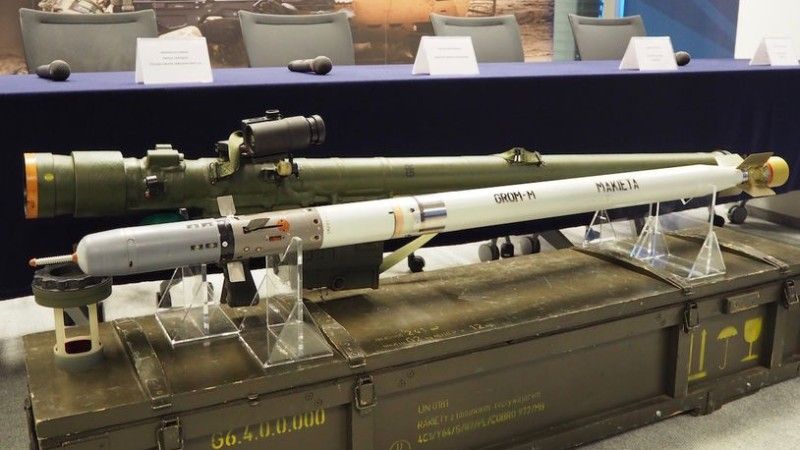Technology
Piorun MANPADS Missile Programme Delayed. Deliveries Expected Soon

Polish Armed Forces will receive the first batch of the new generation “Piorun” [Thunderbolt] very short range anti-aircraft missiles. However, one should note that the delivery would face a delay of a few months. According to the original assumption, the weapons were to be handed off before the end of last year. As Defence24.pl found out, the probable cause has already been identified. Currently it is assumed that the new missiles would be supplied to the military by the end of March.
Piorun system is a successor of the Grom MANPADS solution, currently operated by the Polish military. The contract envisaging the delivery of the system was signed on 20th December 2016. On the basis of the aforesaid document, 420 launch system units (gripstocks) and 1300 missiles would be received both by the operational units of the military, as well as by the Territorial Defence units. The Agreement also assumes that a training system would be developed and implemented, starting from instructors to shooters to finish with. Work is also going to be undertaken to develop e-learning system and technical documentation. Mesko facility is also working on simulators and trainers. Maintenance systems are also going to be developed. All of the elements above are a part of a separate agreement signed with the MoD.
The first 40 gripstock units and 150 missiles were to be received by the military last year, which, ultimately, did not happen. As Defence24.pl has unofficially learned, the performance one of more than ten of the test-launched missiles did not comply with the assumed specification. The probable cause has already been identified; it was related to one of the subcontracted components. This means that the missiles and launchers (gripstocks) are to be received by the military until March.
It is also planned that 60 gripstocks and 200 missiles would be handed-off, in line with the original assumptions contained within the agreement. Piorun missiles would be used both within the operational units, as well as within the currently formed Territorial Defence component.
Before the contract was signed, the Polish Ministry of Defence had decided to significantly increase the number of missiles expected to be procured before 2022. Initially it was assumed that around 200 gripstocks would be procured with 500 missile rounds to follow. Ultimately though, it turned out that much more systems as such would be received by the Armed Forces.
Not only will the Piorun missiles be used in their portable form, as they may also become a component of VSHORAD systems of Polish design, or in case of modernized Soviet solutions. Here we are referring both to Poprad and Pilica systems, but one should also remember the Biała and Jodek-G platforms, currently integrated with the Grom missile. In the latter case, only a minor degree of modification would be required.
Piorun MANPADS is a result of an R&D initiative undertaken by Mesko in collaboration with the Telesystem-MESKO company. The latter entity was responsible for development of the seeker. The agreement concerning the aforesaid development work was signed back in 2010, by and between MESKO and the Polish Ministry of Defence.
During the Piorun development programme, the main emphasis was placed on two aspects: extending the range and enhancing the seeker capabilities. The new IR-guidance system turned out to be much more resistant to a variety of countermeasures. It may also detect and track targets located much further away, this includes UAVs, PGMs and cruise missiles, all of which pose a challenge for any seeker.
Meanwhile, Piorun also offers extended range, when compared to the Grom system - it may be used to neutralize threats at distances of up to 6.5 kilometres flying at altitudes of up to 4 kilometres. The gripstock unit also features a daytime/night sight, making it possible to utilize the portable systems in bad weather conditions and at night.
Piorun should be seen as a development of the Grom MANPADS system dating back to the 1990s. Grom is used by a myriad of Polish military units tasked with VSHORAD operations. Modernized Biała and Jodek anti-aircraft systems may also utilize a Grom-derrived effector.
This type of missiles may act against airborne threats at distances of up to 5.5 kilometres, flying at altitudes of up to 3.5 kilometres. The missiles in question were and still are being exported. They have been received, inter-alia, by the Lithuanian, Indonesian and Georgian armies. In case of Lithuania the deliveries are still in progress. They are to last until 2022, with the contract signed back in 2014. In case of Georgia, on the other hand, the system was used in combat back in 2008, against the Russian forces. The Polish industry also developed a conceptual framework for modernization of the existing Grom systems, in collaboration with the R&D entities. The project assumes that capability to act against cruise missiles would be enhanced.
Read More: PK-6 Anti-Aircraft Missile Polish Ordnance for Poprad and Osa Air Defence Systems
Introduction of the Grom system made it possible to replace the obsolete post-soviet Striela-2M solution in the Polish military, license manufactured by Mesko. This is one of a few examples of a generational leap in the Polish military, after 1989, made with the use of domestically available R&D potential.
The planned delivery of Piorun systems would constitute yet another step in the process of modernizing the very short range air defence potential.
It shall be noted that a concept of further development of capabilities has been created, with regards to IR-guided VSHORAD systems. Within a few years it could be possible to develop a new missile utilizing the Piorun’s seeker, but offering a range of 10 to 12 kilometres. Effector as such could be potentially integrated with the Poprad system, as well as with the newly developed air defence solutions that could be used to protect mobile units of the land forces, replacing the Shilka/Biała platforms. It would become a bridge solution between Groms and Pioruns, and Narew system offering a greater range, but employing different tactics, discriminate from the operational philosophy used in case of direct air defence solutions.
